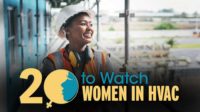Name: Kate Dennis
Title: Mechanical Designer, IMEG Corp.
Age: 28
Educational Experience: Bachelor's Degree in Mechanical Engineering, Missouri University of Science & Technology
Organizational Affiliations/Achievements/Awards: ASHRAE Member and Young Engineers in ASHRAE Member
What caused you to/when did you fall in love with engineering?
When I was 10, I went to the Cosmosphere in Hutchinson, Kansas, and decided then and there I was going to be a rocket scientist. As I got older, my interest in space didn’t waver, but I changed my career aspirations to align with what I wanted the rest of my life to look like.
What has been the most rewarding aspect of working in the skilled trades?
Being able to see the work I’ve done get implemented in local buildings by myself or people I know is incredibly rewarding. I’m very drawn to establishing community, and being able to be a part of my community in tangible ways like that is rewarding.
Describe the proudest moment in your career.
My proudest moment so far was the end of the design phase of a large university building, where I was the lead mechanical designer. I led the ventilation, piping, plumbing, and fire protection design for the project. The work was far from over at the end of the design phase, but I was proud of the effort my team and I had put in, and I was proud of the product we gave to the client.
What challenges do women face in this profession? Can you give a personal example? Why aren’t there more women in engineering? How can we increase the number of women in engineering?
Women are not always taken seriously in male-dominated professions. I often must push back against contractors and clients who question my decisions or input. Contractors, clients, and even co-workers regularly over-explain things to me. I try to give them the benefit of the doubt and assume they’re trying to be helpful, but it comes across as if they think I don’t know things because I’m a younger woman.
Unfortunately, sexism and bias are still significant obstacles in the industry, and a lack of diversity is a cyclical problem. Industries with few women often don’t attract women.
Ways to increase the number of women in engineering overlap with increasing any other demographic: provide benefits that people want, offer paid maternity leave, offer flexible working hours, allow for more remote work, offer health care plans that are affordable and provide considerable coverage, and increase salaries.
What does your day-to-day job entail?
Depending on my schedule, I have anywhere from 10-15 active projects, half of which I typically serve as the project manager on. I dedicate time each day to respond to emails from clients and co-workers, focus on design time, and complete my project management duties. Daily, weekly, even monthly planning is required to make sure I have enough time and resources to balance all of my projects.
What drives/motivates you every day?
The desire to make a difference in my community and to make the engineering consulting industry better with my contributions is what motivates me.
How has the COVID-19 pandemic impacted you personally and professionally?
Professionally, it has opened a lot more options for remote work. I was able to transfer offices within my company in part because of our new utilization of remote work options so I could remain with my same team.
Personally, I decided to move cities to be closer to my family, which was something I had been planning to do for some time. It turns out, a global pandemic makes you think about what you really want in life and motivates you to go for it.
What remains on your engineering bucket list — what do you aspire to do that you haven’t accomplished yet?
I would love to be able to work on a professional sporting arena. Kansas City has very loyal sports fans, and it would be a dream to work on a facility that’s so important to the local culture.
What’s one thing no one knows about you?
Most people know that I have a cat named Ollie. Most people don’t know that his full name is Oliver Biscuits Garfield. I never use it, there’s no documentation for it, and it has no purpose other than to amuse me.
List any mentors who’ve helped you succeed and describe exactly how they’ve shaped your success.
My parents have encouraged and supported me in all my aspirations, both professionally and outside of work. They set good examples of work ethic and work-life balance.
My co-workers who led me through IMEG’s mentoring program my first two years of working really helped me develop my organization skills, attention to detail, and gave me valuable insights from their careers in both design and management.
What advice do you have for prospective female engineers considering entering the field?
It’s OK to be intimidated. Being intimidated doesn’t make you any less capable or valuable.




